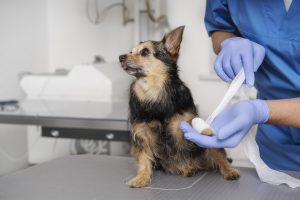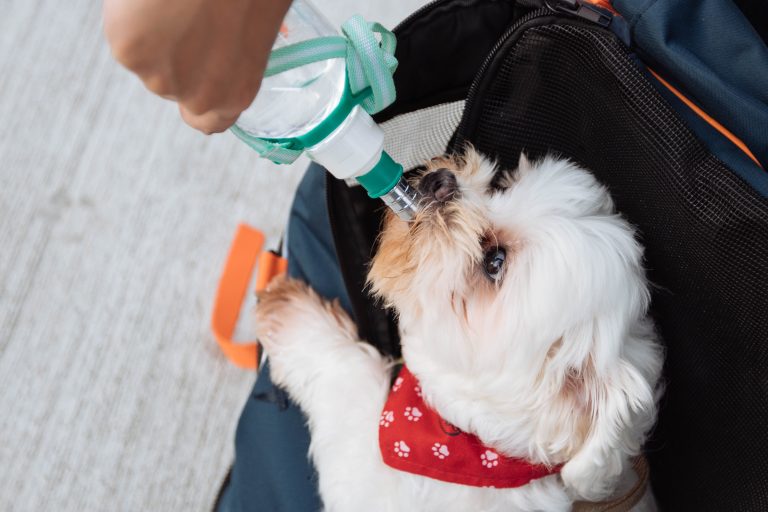Dehydration in dogs is a condition that can occur for various reasons and can have serious consequences for their health. It is essential to understand the signs and causes of dehydration in order to prevent and treat this problem properly.
CONTENT:
- Symptoms of Dehydration in Dogs
- Causes of Dehydration in Dogs
- Prevention and Treatment of Dehydration
- Conclusion
Symptoms of Dehydration in Dogs
-
Dry Mouth and Reduced Saliva
Dry mouth and dry paws are the first visible signs of dehydration in dogs. These signs are easy to spot because healthy dogs normally have a moist mouth and produce sufficient saliva. A dehydrated dog may exhibit this symptom by constantly seeking water, excessive lip licking, or even rubbing his mouth with his paws in an alarming manner.
-
Lethargy and Weakness
Another common manifestation of dehydration is lethargy and weakness. A dehydrated dog may appear lack of energy and show an obvious loss of interest in activities. They may sleep more than usual and show signs of excessive fatigue, even after minor activities. Sometimes this behavior can be misinterpreted as a lack of enthusiasm or just part of the dog’s personality, which is why owners may not immediately notice the warning signs of dehydration.

-
Loss of Skin Elasticity
Another way to check for dehydration in dogs is to gently pull the skin on the back of the dog’s neck or back. As a rule, the skin of a hydrated dog quickly returns to its original shape when it is gently pulled. However, in a dehydrated dog, the skin may slowly return to its original shape or appear sticky and less elastic.
-
Red Mouth and Throat
Another visible sign of dehydration can be seen in the color of the dog’s mouth and throat. If you notice that these areas are red, it may indicate dehydration accompanied by rapid breathing. In some cases, the gums may become dry or paler than usual.
-
Decreased or No Urination
Dehydrated dogs may produce little or no urine. When he urinates, it may become concentrated, dark in color, or have a strong odor. This is a sign that the dog’s body is trying to retain as much water as possible.
-
Persistent Vomiting or Diarrhea
Persistent vomiting and diarrhea can worsen the dog’s fluid loss. These symptoms can be caused by various conditions, but can also be an indicator of dehydration. It is important to pay attention to these symptoms and consult a veterinarian for proper evaluation and treatment.
Causes of Dehydration in Dogs
-
Limited Access to Water
Lack of access to fresh, clean water is one of the main causes of dehydration in dogs. Especially when left outside or during walks, if there is no accessible source of water, dogs can have difficulty staying hydrated. Also, small containers or not supervising the dog during periods when it does not have access to water can lead to dehydration.
-
Exposure to High Temperatures
Dogs exposed to high temperatures are prone to dehydration, especially during the hot season or in warm climates. Dogs cannot regulate their body temperature as efficiently as humans do, and prolonged exposure to heat can lead to significant water and electrolyte losses through sweating and rapid breathing. This can be exacerbated by a lack of access to fresh, refreshing water.

-
Illness or Infections
Conditions such as gastrointestinal disease or infection can quickly lead to dehydration in dogs. Vomiting and diarrhea can cause significant fluid and electrolyte loss from the body. These conditions often require immediate medical attention to rebalance the dog’s hydration levels and treat the underlying cause.
-
Intense Physical Effort
Intense and strenuous physical activities, especially without sufficient water, can lead to rapid dehydration in dogs. Prolonged exercise or intense training in hot conditions can cause dogs to sweat excessively and lose significant amounts of water and electrolytes from the body.
-
Kidney Diseases or Other Conditions
Certain health conditions, such as kidney disease or diabetes, can lead to chronic or persistent dehydration in dogs. These conditions affect the body’s ability to maintain a proper balance of fluids and electrolytes, leading to dehydration even in the absence of external factors such as lack of water or high temperatures.
Prevention and Treatment of Dehydration
-
Ensuring Access to Water
One of the most important measures to prevent dehydration in dogs is to ensure constant access to clean, fresh water. Whether at home or on walks, make sure water bowls are always filled and available for your dog.
-
Monitoring Signs of Dehydration
Watch out for the signs of dehydration I mentioned earlier. Watch for changes in behavior, skin hydration, or any other sign that you may be dehydrated. Close monitoring of your dog will help you intervene quickly if a problem arises.
-
Oral Rehydration for Mild Cases
In mild cases of dehydration, offering fresh water and encouraging the dog to drink can help with rehydration. There are also special rehydration solutions available in veterinary stores that can be used to restore hydration levels.
Consultation of a Veterinarian
For severe or persistent cases of dehydration, it is essential to consult a veterinarian. A professional will be able to assess the dog’s condition and recommend the appropriate treatment. In severe cases, intravenous fluids may be necessary to rapidly rebalance hydration levels and prevent complications associated with severe dehydration.
The Importance of Health Monitoring and Regular Veterinarian Consultation:
Regular monitoring of the dog’s health and periodic visits to the veterinarian are essential to detect and treat health problems in the early stages. During consultations, the vet can offer advice on feeding, hydration and other aspects of dog care.

Conclusion
Dehydration in dogs is a serious problem that requires immediate intervention. Close monitoring of your dog’s health and behavior, along with ensuring constant access to clean, fresh water, are essential to preventing and treating dehydration in dogs. Also, regular vet consultation helps maintain overall health and prevent complications associated with dehydration and other health conditions.

